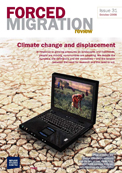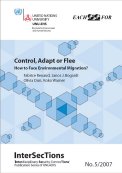Posted by Kayly Ober on September 13th, 2011 | 
(World Policy Blog) September 12, 2011 – In the 1990s, the Intergovernmental Panel on Climate Change asserted that “climate migrants” would be one of the most dire consequences of climate change. This, at times contentious argument, centers on how climate change acts as a “threat multiplier,” exacerbating existing environmental and social factors that drive migration.
A precise correlation is difficult to draw. But by 2050, climate impacts—flooding,
erosion, and extreme weather events—are expected to displace between 50 million and one billion people.
The international community has rightly increased its attention on the issue. Some experts argue that migration is simply a failure to adapt to climate change.
Strategies should focus on helping people adapt “in situ,” or find sustainable ways to remain where they are.
In many cases, this is an appropriate response, but that’s not always possible. What happens when staying put threatens survival?
If our nomadic forbears have taught us anything, it is that remaining in one place is not always a good idea. There has been far less discussion on what we call “climate immobility,” how populations affected by climate change may not have the means (or the ability) to move to less vulnerable places—even when their survival depends on it.
Continue reading this post »
Posted by Kayly Ober on September 13th, 2011 | 
how to get your ex back fast free and
get ex boyfriend back letter or
best way to win ex girlfriend back after texting her too much.
ways to get a ex girlfriend back
I dont want my exgirl friend back, my ex keeps an emotional hold on me, etc.
how to win my girlfriend back
On November 10-11, 2011 the University of New South Wales will host “Climate Change and Migration in the Asia-Pacific: Legal and Policy Responses” at NSW Parliament House in Sydney.
This two-day conference will bring together leading international experts, policymakers, and government officials from affected countries to discuss:
- Conceptualizing climate change-related movement
- The nature of moveme
My ex fight with me den he say sorry, i want my boyfriend back but not sure he stands.
tips to get ex boyfriend back
what to text to my ex girlfriend to win her back
how do i get back with my ex girlfriend
how to get your ex boy friend back
How can I get my fiancé back Please help me
what do i do to get my ex boyfriend back if he is with someone
how do i get back my boyfriend
es dv ex back men box
tips of winning back your ex boyfriend love after a breakup
texts to get him back
how to get your ex husband to want you back
Signs to find ex girl still love
Will my long distance ex contact me
what to
do if you broke up with your boyfriend want him back
how to get ex gf in bed
messaging your ex girlfriends friends
ways to get your ex to want you back
is it hard to get your ex girlfriend back
nt: what does the evidence tell us?
- International legal frameworks
- International governance
- Adaptation and ‘migration with dignity’
- Relocation and land tenure
- Climate change migration and (human) security
- Institutional responses: where to from here?
Register online: http://www.gtcentre.unsw.edu.au/events/climate-change-and-migration-asia-pacific-legal-and-policy-responses
Cost: $150 for both days (including lunch, morning tea & afternoon tea). Single day registration is not possible.
Contact: gtcentre@unsw.edu.au
Posted by Dan DaSilva on September 10th, 2011 | 
(Inter Press Service) September 9, 2010 – MEXICO CITY, “We planted
our seeds, but the earth is no longer productive. We’ve had too much rain, even more than last year, and the harvest was ruined,” says Ermelinda Santiago of the Me’phaa indigenous people, who like everyone else in the village of Francisco I. Madero has been affected by the impact of extreme weather on agriculture in southern Mexico.
The 25-year-old woman is one of thousands of native people who migrate every year from the municipality of Tlapa and its surroundings in the southern state of Guerrero, to pick fruit and vegetables in the north of the country.
Tlapa, one of the poorest places in Mexico, is ravaged by deforestation, intermittent drought and torrential rains, so that farming is not an economically viable occupation for local people.
Regions like Tlapa illustrate the possible relationship between climate change and migration, an issue that is coming under scrutiny in Mexico, a country that is vulnerable to the effects of phenomena like prolonged droughts, soil degradation, devastating rainstorms, lack of water and rising sea levels.
Continue reading this post »
Posted by Dan DaSilva on September 10th, 2011 | 
Eurasylum (www.eurasylum.org) has just released its new monthly policy
interview, featuring Ms. Margareta
Wahlström, Special
Representative of the UN Secretary-General for Disaster Risk Reduction. The interview is on: “Climate change and migration: the latest evidence”.
The interview can be accessed here.
Posted by Kayly Ober on August 29th, 2011 | 
On September 21, 2011, the Institute of Social Studies in The Hague will host the symposium “Climate Change, Conflict, and Migration: The Water Context,” which will serve as a platform
to discuss the links between climate change, water stress, migration, and conflict from a human security perspective. The discussion will revolve around capacity building and resilience in hotspots, conflict prevention, and a (international) legal framework of protection of environmental migrants.
Speakers:
- Mr Marius Enthoven – Chairman, Alliance for UPEACE
- Mr Rolain Borel – Head, Department of Environment, Peace and Security, University of Peace (UPEACE), Costa Rica
- Mr Muniruzzaman, Major General (ret) – President, Bangladesh Institute for Peace and Security Studies (BIPSS), Dhaka, Bangladesh
- Mr Tamer Afifi – Associate Academic Officer, United Nations University, Institute for Environment and Human Security (UNU-EHS), Bonn, Germany
Panel, chaired
by Mr Wouter Veening (Institute for Environmental Security):
Introductions by:
- Mr Joost van der Aalst – Chief of Mission, International Organisation for Migration, The Hague, The Netherlands
- Mr Wybe Douma – Senior Researcher, T.M. Asser Institute, The Hague, The Netherlands
A panel of experts with field experience will illustrate practical problems and solutions related to water availability and the protection against droughts and floods.
Click here for more information.
Posted by Kayly Ober on August 26th, 2011 | 
Researchers’ Workshop on Climate-Induced Migration & Policy Responses to Climate-Induced Migration in Asia and the Pacific: Regional Conference
Manila, Philippines, 14 – 16
September 2011
Asia and the Pacific will be amongst the global regions most affected by the impacts of climate change. Countries of the region are particularly vulnerable because of a high degree of exposure to environmental risks and large population. In recent years, Asia and the Pacific has undergone massive and rapid socioeconomic transformation.
Migration within countries, especially from rural to urban areas, has become significant. Countries and populations of Asia and the Pacific will be affected by climate change in different ways, leading to
various migration scenarios. Cross-border migration is likely to increase. Already, the region is home to the most important source of international migrants worldwide.
In 2010, more than 30 million people in Asia and the Pacific were displaced by environmental disasters, such as storms and floods. Many returned home, but others did not. Climate change is expected to increase the frequency of extreme weather events, and over time induce significant sea-level rise. At the same time, the region’s population, now around 4 billion, continues to increase. These developments will result in growing numbers of people on the move for reasons that include environmental factors.
Continue reading this post »
|
|



